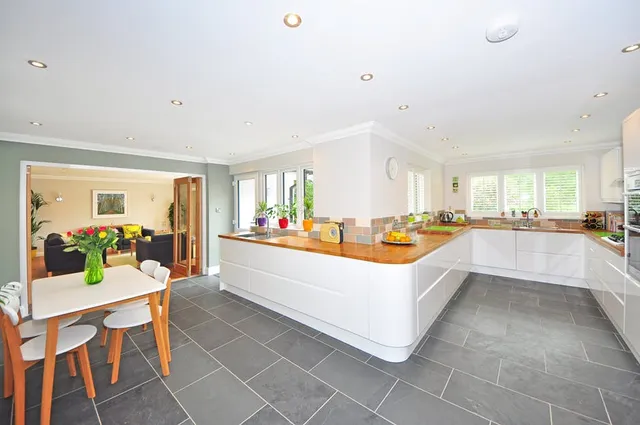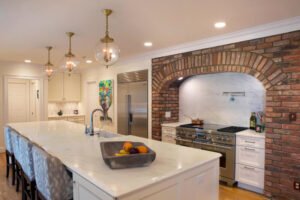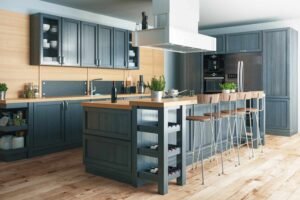Choosing the proper flooring for kitchen is important to create a useful and aesthetically pleasing space as kitchen is one of the rooms in the house that is used the most. It can be really difficult to find the proper flooring as there are wide range of options available for flooring. In this article, we will examine different flooring alternatives available in the market, their advantages and disadvantages, and important factors.
1. Evaluate your needs and Lifestyle:
It is really important to consider your needs and lifestyle before exploring all possible flooring options. Consider the factors such as your personal design preference, how often spills and dampness are exposed, foot traffic, and whether there are pets and kids around. By being aware of these factors, you can reduce the number of flooring options to those that best fit for your kitchen’s needs.
2. Water Resistance and Stability:
While choosing flooring for a kitchen, water resistance and stability are most important factor to consider. Selecting a flooring material which can survive these challenges is important as kitchen is vulnerable to stains, spills and moisture. Some of the most water resistant and resilient choices are:
- Luxury Vinyl Plank: Luxury Vinyl Plank or LVP is a type of flooring that imitates the look of hardwood. It combines the timeless attraction of wood with the strength and water resistance of vinyl. If you want the appearance of hardwood without maintenance issues, LVP is an excellent choice.
- Vinyl: Vinyl flooring is a different fantastic option which is well-known for its water resistance and stability. It is available in different colors and designs including variations that resembles organic materials like wood or stone. Furthermore, vinyl is inexpensive and simple to maintain.
3. Maintenance and Service:
Consider the care and maintenance and needs for each type of flooring. Some materials are low maintenance and easy to clean, while others require more often maintenance, such as refinishing and sealing. Be honest with yourself about how much time and work you are willing to put into cleaning your kitchen floor.
4. Efficiency and Durability:
The kitchen is a place where you spend a lot of time standing and walking around. The importance of considering the efficiency and durability of flooring is thus essential. A few alternatives that offers both are as follows:
- Rubber: Rubber flooring provides an excellent efficiency and durability. For individuals who work in kitchen for longer period of time, it is the best option as it absorbs pressure and offers a comfortable surface to stand on. Also rubber flooring is slip-resistant and easy to maintain.
- Cork: Kitchen floors can be made using cork, which is both beneficial to the environment and comfortable. It promotes underfoot cushioning, which reduces stress on joints and fatigue. Cork is an excellent choice for kitchen that are subjected to moisture, it is also naturally resistant to mold and mildew.
5. Design and Style:
The flooring you choose for kitchen should not be only useful but also improves the overall appearance of your kitchen. Choose a type of flooring that matches with the existing design features, such as cabinets, countertops, and backsplash.
- Bamboo: Bamboo is a great choice, if you are looking for a sustainable flooring form. It is long-lasting, strong and provides a variety of colors. To make sure that the bamboo flooring you have bought is water resistant, it is important to select a floor that is specifically designed for kitchen.
- Hardwood: Hardwood flooring provides kitchen a comfortable, classic feel. It is available in different colors, coatings and species which allows one to select the best match for your aesthetic preferences.
- Laminate: It provides the appearance of hardwood or stone at a very low cost. It is available in an extensive range of colors and designs and is extremely versatile. It is simple to clean, long-lasting and immune to stains and aging.
Conclusion:
The right flooring for your kitchen should take durability, water resistance, comfort, style, and maintenance requirements into account. To choose the best flooring for your kitchen, consider your unique needs and way of life while looking at several possibilities. When designing a room, keep in mind to strike a balance between form and function.
FAQs
1. Is it feasible for me to install the flooring in the kitchen?
Yes, a lot of flooring options can be installed by the homeowner. It’s crucial to pay close attention to the manufacturer’s instructions and make sure you have the right equipment and knowledge. It is recommended to engage a professional if you are hesitant or if the project entails complicated procedures like subfloor preparation or electrical installation.
2. How do I maintain and clean the flooring in my kitchen?
Depending on the flooring type you select, different floors have different cleaning and care requirements. The majority of flooring solutions only require occasional mopping with a mild cleanser and routine sweeping or vacuuming. Abrasive or harsh chemicals should not be used since they may harm the surface.
3. Is it possible to put hardwood floors in my kitchen?
It’s crucial to keep in mind that while hardwood flooring can offer warmth and beauty to a kitchen, it also takes more upkeep and is more prone to water damage than other options. If you decide to go with hardwood, make sure to clean up spills right away and think about putting area rugs in high-traffic and spill-prone areas.



